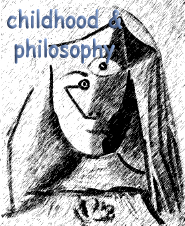why am i here? the challenges of exploring children's existential questions in the community of inquiry
DOI:
https://doi.org/10.12957/childphilo.2020.47050Keywords:
existential questions, taboo topics, community of inquiry, children on the meaning of life, children on death.Abstract
Children ask existential questions, that is, questions about death, the meaning of existence, free will, God, the origin of everything, and kindred questions. P4/wC has the aspiration to give to children the occasion to discover and explore their questions in a safe environment, the community of inquiry. Thus, existential questioning should be possible in a community of inquiry. However, it is unclear whether the pedagogy of the community of inquiry can accommodate existential questioning. The chief trouble is that existential questioning might be a cause of suffering: children might be unable to contain the emotional intensity that is experienced when we inquire about topics like death and the meaning of existence. In a community of inquiry, the emphasis over the community and the autonomy that children experience in choosing the questions for their inquiry might create occasions of suffering: some children might not be prepared to discuss existential issues or might be troubled by the candidate answers they explore and eventually end up to endorse. In this paper I highlight some of the main challenges that we need to face if we want to make room for existential questioning in the community of inquiry.
Downloads
References
Author (ms). Contemplative Thinking in the Community of Philosophical Inquiry.
Camus, Albert (1942/1955). The Myth of Sisyphus and Other Essays, New York: Alred A. Knopf, 1955
Caruso, G, & Flanagan, O. (eds.) (2018). Neuroexistentialism: Meaning, Morals, and Purpose in the Age of Neuroscience. New York: Oxford University Press.
Daniel, M. A., Schleifer, M. and Lebouis, P. (1992) Philosophy for Children: The Continuation of Dewey's Democratic Project, Analytic Teaching. 13.1, pp. 3-12
De Marzio, D.M. (2011). What happens in philosophical texts: Matthew Lipman’s theory and practice of the philosophical text as model. Childhood & Philosophy 7(13): 29–46.
FitzPatrick, W. (2016). "Morality and Evolutionary Biology", The Stanford Encyclopedia of Philosophy (Spring 2016 Edition), Edward N. Zalta (ed.), URL = <https://plato.stanford.edu/archives/spr2016/entries/morality-biology/>.
Frankl, V. (1963/1984) Man’s search for meaning, 3rd edn. First Washington Square Press, New York
Gregory, M. (2008), 'On Philosophy, Children, and Taboo Topics' in Philosophy for Children: a Practitioner Handbook, Institute for the Advancement of Philosophy for Children, pp. 53-4.
Heidegger, M. (1927/1962). Being and Time, translated by John Macquarrie and Edward Robinson, Harper & Row publishing.
Heidegger, M. (1929/1993). “What is Metaphysics?”, translated by D. F. Krell, in D. F. Krell (ed.) Martin Heidegger: Basic Writings, revised and expanded edition, London: Routledge, 1993, pp. 93–110.
Heidegger, M. (1966). Discourse on Thinking: A Translation of Gelassenheit. Tr. John M. Anderson and E. Hans Freund. New York: Harper & Row.
Kronman, A. T. (2007). Education's End: Why Our Colleges and Universities Have Given Up on the Meaning of Life. Yale University Press.
Lipman, M., Sharp, A. M. and Oscanyan, F. S. (1980) Philosophy in the Classroom (Philadelphia, Temple University Press).
Otto, R. (1959), The Idea of the Holy: An Inquiry into the Non-Rational Factor in the Idea of the Divine and its relation to the Rational, tr. J.W. Harvey, Harmondsworth: Penguin Books.
Matthews, G. B. (1980). Philosophy and the Young Child. Harvard University Press.
Murris, K. (2016). The Philosophy for Children Curriculum: Resisting ‘Teacher Proof’ Texts and the Formation of the Ideal Philosopher Child. Studies in Philosophy and Education 35 (1):63-78.
Nozick, R. (1981). Philosophical Explanations. Harvard University Press.
Peirce, C. S. (1877). The Fixation of Belief. Popular Science Monthly 12 (1):1--15.
Pramling, I. & Johansson, E. (1995), 'Existential Questions in Early Childhood Programs in Sweden: Teachers' Conceptions and Children's Experience'. Child & Youth Care Forum, 24(2), April 1995
Puolimatka, Tapio & Solasaari, Ulla (2006). Education for death. Educational Philosophy and Theory 38 (2):201–213.
Sartre, J.-P., (1938/1959). Nausea. Tr. Lloyd Alexander. New York: New Directions.
Tolstoy, L. (1880/2006). A Confession. Translated by Jane Kentish. Penguin Books.
Sharp, A. M. & Splitter, L. J. (2000). The Doll Hospital. Australasian Council for Educational Research.
Sharp, A. M. (1993) The Community of Inquiry: Education for Democracy, in: M. Lipman (ed.) Thinking Children and Education (Kendall, Hunt Publishing Company), pp. 337–345.
Sharp, A. M (1996/2017). Silence and Speech in Pixie 1, 2. In Gregory, M. R. (Ed.), Laverty, M. J. (Ed.). (2018). In Community of Inquiry with Ann Margaret Sharp. London: Routledge.
Sharp, A. M. (2012). In the Beginning was the Deed: Empowering Children Spiritual Consciousness. in Thinking: The Journal of Philosophy for Children, Volume 20, Issue 1/2, 2012, pp. 3-10
Shea, P. (2017). Do we put what is precious at risk through philosophic conversation? In Gregory, M. R. (Ed.), Laverty, M. J. (Ed.). (2018). In Community of Inquiry with Ann Margaret Sharp. London: Routledge, Chapter 12.
Turgeon, W. C. (2015) The Art and Danger of the Question: Its Place Within Philosophy for Children and Its Philosophical History, Mind, Culture, and Activity, 22:4, 284-298.
Vansieleghem, N. (2005). Philosophy for children as the wind of thinking. Journal of Philosophy of Education 39 (1):19–35.
Yalom, I. D. (1980) Existential psychotherapy. Basic Books, New York
Worley, P. (2011). The If machine. London, England: Continuun.
Davis, W. E. and Hicks, J. A. (2013). Judgments of Meaning in Life Following an Existential Crisis. In A. Will Crescioni, Roy F. Baumeister (auth.), Joshua A. Hicks, Clay Routledge (eds.) The Experience of Meaning in Life. Classical Perspectives, Emerging Themes, and Controversies. Springer Netherlands.
Wittgenstein, L. (1929/2014). Lecture on Ethics. Wiley-Blackwell.



